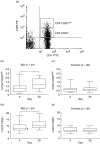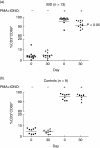Anti-inflammatory effects of probiotic yogurt in inflammatory bowel disease patients
- PMID: 17590176
- PMCID: PMC2219330
- DOI: 10.1111/j.1365-2249.2007.03434.x
Anti-inflammatory effects of probiotic yogurt in inflammatory bowel disease patients
Abstract
Our aim was to assess anti-inflammatory effects on the peripheral blood of subjects with inflammatory bowel disease (IBD) who consumed probiotic yogurt for 1 month. We studied 20 healthy controls and 20 subjects with IBD, 15 of whom had Crohn's disease and five with ulcerative colitis. All the subjects consumed Lactobacillus rhamnosus GR-1 and L. reuteri RC-14 supplemented yogurt for 30 days. The presence of putative regulatory T (T(reg)) cells (CD4(+) CD25(high)) and cytokines in T cells, monocytes and dendritic cells (DC) was determined by flow cytometry from peripheral blood before and after treatment, with or without ex vivo stimulation. Serum and faecal cytokine concentrations were determined by enzyme-linked immunosorbent assays. The proportion of CD4(+) CD25(high) T cells increased significantly (P = 0.007) in IBD patients, mean (95% confidence interval: CI) 0.84% (95% CI 0.55-1.12) before and 1.25% (95% CI 0.97-1.54) after treatment, but non-significantly in controls. The basal proportion of tumour necrosis factor (TNF)-alpha(+)/interleukin (IL)-12(+) monocytes and myeloid DC decreased in both subject groups, but of stimulated cells only in IBD patients. Also serum IL-12 concentrations and proportions of IL-2(+) and CD69(+) T cells from stimulated cells decreased in IBD patients. The increase in CD4(+) CD25(high) T cells correlated with the decrease in the percentage of TNF-alpha- or IL-12-producing monocytes and DC. The effect of the probiotic yogurt was confirmed by a follow-up study in which subjects consumed the yogurt without the probiotic organisms. Probiotic yogurt intake was associated with significant anti-inflammatory effects that paralleled the expansion of peripheral pool of putative T(reg) cells in IBD patients and with few effects in controls.
Figures






References
-
- O'Sullivan GC, Kelly P, O'Halloran S, et al. Probiotics: an emerging therapy. Curr Pharm Des. 2005;11:3–10. - PubMed
-
- Kirjavainen PV. Probiotics and the management of food allergy. In: Mattila-Sandholm T, Saarela M, editors. Functional dairy products. Cambridge, UK: Woodhead Publishing; 2003. pp. 108–31.
-
- Fedorak RN, Madsen KL. Probiotics and the management of inflammatory bowel disease. Inflamm Bowel Dis. 2004;10:286–99. - PubMed
-
- Di Giacinto C, Marinaro M, Sanchez M, Strober W, Boirivant M. Probiotics ameliorate recurrent Th1-mediated murine colitis by inducing IL-10 and IL-10-dependent TGF-beta-bearing regulatory cells. J Immunol. 2005;174:3237–46. - PubMed
Publication types
MeSH terms
Substances
LinkOut - more resources
Full Text Sources
Other Literature Sources
Medical
Research Materials

